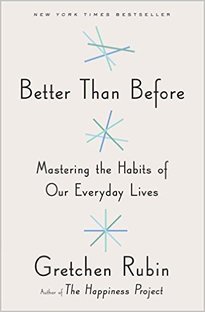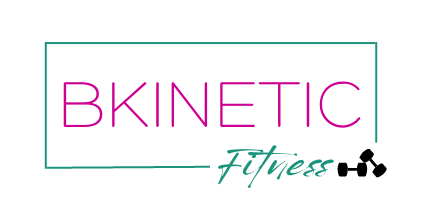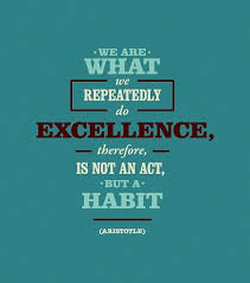For Day 5 of 31 Days of Fat Loss, we’ll discuss how changing our daily habits through a little introspection work can help us succeed.

We all have our fair share of bad habits. Maybe it’s staying up too late, eating too much junk food after dinner, biting our nails when we’re nervous or anxious, or leaving projects to the very last minute. We don’t quite know how they started, but they have become so automatic that we barely notice that we’re doing them.
The good news is, we can totally use this to our advantage and create great habits that serve our lifestyles and goals. Habits are built over time through a series of consistent actions and behaviors, day in and day out. It’s a skill that is learned and practiced, not something that only a few lucky people possess.
We are all different, and we sometimes need different solutions to our common problems. There is no one magic formula that works for everyone. But instead of despairing when something doesn’t work for us, and us thinking that it’s us who is failing, consider it feedback. What worked? What didn’t? Can you tweak it to better fit your lifestyle and preferences for better success?
This process starts with digging deep into who you are and using that self-knowledge to create a game plan for success.
A book on habits that I recently picked up is Gretchen Rubin’s book Better Than Before: Mastering the Habits of Our Everyday Lives, which tackles the subject of habits in an accessible and simple way. She separates people into one of four groups, or “Tendencies” — Obliger, Upholder, Rebel, Questioner.
The Obliger meets outer expectations but struggles to meet inner expectations. The Upholder meets both outer and inner expectations. The Rebel resists both outer and inner expectations. The Questioner resists outer expectations and meets inner expectations. They question everything and will only meet an expectation if they believe it’s justified. No one tendency is best; they each hold their own pros and cons. These distinctions can help explain why some people can make and keep New Year’s resolutions with ease and others struggle. And why some people need external accountability, yet others see it as a restriction.
If you’re interested, you can take her quiz here to find out which of the Four Tendencies that you align with. Using this information you can have a better idea of how to move forward with building effective habits, along with the following questions:
A night owl such as myself will have difficult time establishing an early morning workout routine, and a lark may find themselves too tired most days to stick to a post-work routine. Use the times when you are the most energetic to schedule your important habits and come up with workarounds during times of low mental and physical energy, such as a taking a walk after dinner to distract ourselves instead of watching tv and relying solely on willpower to help curb the post-dinner munchies.
Are you more likely to indulge in a bad habit in a group, or when alone?
Sometimes others’ behaviors and choices can influence our own, such as our food choices at weekly happy hours with friends or family get-togethers. In this case, we can try to limit our frequency of these events or come up with ways to not fall into that trap, like deciding ahead of time what to order so as not to be overly tempted by the unhealthy yet tasty menu items. Just being aware of this one aspect of our bad habits can help tremendously with circumventing situations that sabotage our good intentions.
Do you prefer familiarity or novelty?
Using exercise as an example, if you like having a set familiar routine, you’d probably benefit more in the long run from doing the same thing everyday. Someone who likes novelty may be more likely to stick with a habit that includes a lot of variety, like trying out a new activity or class each week.
Do you prefer to take small steps or big steps?
I’m usually an advocate of baby steps, as it is an approach that works for most people, but there are some that get more from making BHAGs (Big Hairy Audacious Goals, ala Jim Collins’ Built to Last).
Benefits to taking it slow:
Prevent overwhelm
Frequent reinforcement
Small wins create momentum
Sustainable
Benefits to taking big leaps:
Creates energy and excitement
Less likely to lose interest due to gradualness of change
These are just a few of the questions in Rubin’s book, but they are a good start to getting to know yourself. Armed with this knowledge, you can determine which of the following 3 tools for building habits will be a good bet for you.
3 Tools For Creating and Mastering Habits:
Accountability. Some people do well with a little accountability. It’s tempting to go easy on ourselves and let things slide without an external nudge. This can be having a workout buddy waiting at the gym, an online group or forum, a coach, or keeping a journal that will be viewed by others (coach, others online via an app like My Fitness Pal).
Scheduling. If it’s on the calendar, it will be more likely to get done. It takes the guesswork out of when, if, and how the habit will get done, so less willpower is used to do it and keep it going even when life gets stressful and busy. By keeping an updated schedule, you can help prevent getting overbooked and overwhelmed by all the obligations and minutiae that fill our daily lives and crowd out the important stuff.
Monitoring. This can help us determine whether a habit is working or not and if it’s worth the time, energy, and expense. Not to mention, we are notoriously awful at accurately recalling what and how we are doing. Studies have shown that people can be off by as much as 45% when estimating how much they have eaten or how many calories they have burned. Whether you use a smartphone app or go old-school with pen and paper, the most accurate measure will happen when you track in the moment, rather than at the end of the day or the next day. It is simply impossible to remember every single bite and portion of food and drink consumed in a 24-hour period. Also, weighing and measuring food further ensures accuracy.
As with anything, this kind of detailed monitoring may not the best tactic for some, and may actually backfire. Consider giving it a try for a week or two and determine how it works for you. Once you get the hang of it, it will only take a few extra minutes to log everything, and you’ll have the peace of mind knowing what your intake is and how to adjust it to fit your goals and activity.
Although this whole self-discovery and habit-building process can seem tedious when all you want to do get started and start kicking ass and seeing results, it really is a necessary part of winning the fat loss game. The better we know ourselves, the easier we can create the habits that will make up our daily lives and get us to where we want to be.


